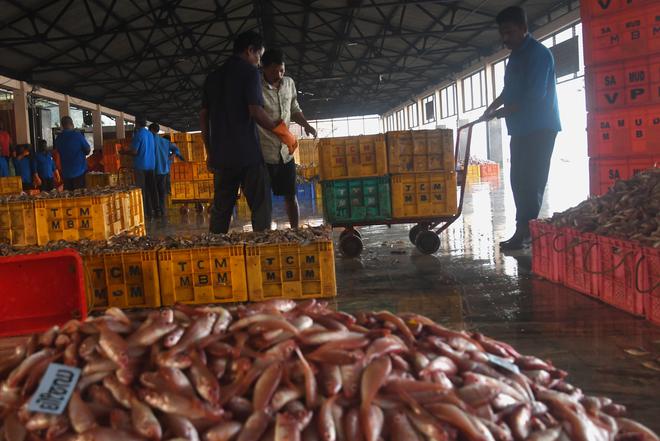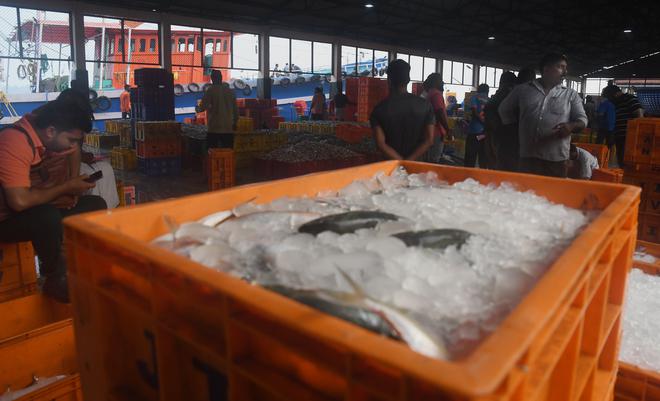K.S. Naushad, 47, from Mattancherry in West Kochi has been working at the Thoppumpady fisheries harbour as a helper for about 30 years, rising at 4 a.m. to be at work in half an hour, when the life begins where land meets water. He would bring freshwater and provisions to boats travelling out to sea for a few days to a month, ferry ice for a fresh catch, and run small errands for any of the transporters or exporters in the harbour.
In the 1990s, when Thoppumpady was referred to as the ‘Gulf of Kochi’, work was aplenty and the pay was good. He was on the cusp of adulthood, and things, he believed then, could only get better. Now, he wonders about the future. “The fish catch has fallen drastically in recent years bringing down the volume of work at the harbour,” says Naushad. Workdays are no more than a few times a month, with employers now picking from a pool of workers.
The scarcity of work has forced Naushad to switch to selling cooldrinks to make a living and look after his family of four. His co-workers stop by his scooter at the gates of the harbour, ordering fruit or lemon juice or curd-based drinks. “I still find occasional work at the harbour, it is not enough for my family’s daily requirements,” he says, the dozens of high mast halogen lamps dimming with the daylight.
More than 4,000 workers like Naushad who work in the fisheries sector and about one lakh people engaged in auxiliary sectors now have little work at the harbour and landing centres at Munambam, Chellanam, Kalamukku, and Thoppumpady in Kerala’s Ernakulam district. They share the same sense of livelihood uncertainty with their counterparts in other districts on Kerala’s 590-kilometre-long coast, with 14 fishing harbours and 12 landing centres.
Brokers, retailers, water suppliers, ice factory workers, and many more, have their fortunes tied to the trade. The clatter of plastic crates and rickety wheelbarrows with iron shovels and ice in them is not as loud as it used to be.
Fishermen who venture out on trawl boats, on ordinary mechanised country boats or two-man fibre boats, and those manning long-liners and gill net boats make these harbours their base of operation. Ordinarily they earn a living that takes care of daily needs; sometimes they make enough to live life well for a few days, when the sea relents.
Trade and economics
According to the Central Marine Fisheries Research Institute (CMFRI), of the total 3.05 million tonnes of marine fish landings in the country, Kerala accounted for 5.55 lakh tonnes in 2021 and 3.61 lakh tonnes in 2020. Numbers from the State Fisheries department also show that Kerala plays a key role in seafood export, accounting for 2.18 lakh tonnes worth ₹8,285 crore, accounting for 12-15% of India’s exports, in 2022-23.
The economic importance of the fish landing centres is evident also in the business turnover in the local market. According to CMFRI data, the value of marine fish landings (fish, shellfish) in Kerala at the landing centres in 2021 was estimated to be ₹11,639 crore. The value of the catch at retail centres rose to ₹14,304 crore. The landing centre cost of the fish in 2020 was ₹7,789 crore and at the retail level the value was estimated to be ₹9,727 crore by the CMFRI.
A variety of factors have been affecting the activities at fish landing centres despite the recorded increase in landings. These include poor physical infrastructure as well as drastic changes in the rain pattern triggered by weather disruptions.
Lack of modern facilities such as chilling plants, decreasing depth of approach waters, poor sanitation and waste disposal facilities, lack of space for activities like net mending, and poor arrangements for drinking water supply are increasingly driving away fishermen from neighbouring States such as Tamil Nadu from the landing centres and harbours in Kerala.
This has a direct impact on the economies that are built around the harbours considering that more than two lakh workers in the auxiliary sector depend on these fishing harbours and boats that reach them with their catch. Among them are small vendors of snacks and tea, service providers, harbour cleaners, shrimp peelers and fish cleaners, net menders, and water suppliers, making up just a few of the list of dependents.

The conditions in what used to once considered the El Dorado by the sea is fast deteriorating even as there is a fall in volume of fish catch. Charles George, who represents traditional fishermen’s union Matsya Thozhilali Aikya Vedi and also the All-India Deep Sea Fishermen’s Association, says there used to be about 650 boats that would call at the harbours in Ernakulam district from Thoothoor in Tamil Nadu.
“These fishermen are now being attracted by facilities being opened up in Tamil Nadu and the decreasing frequency of their calls at fish landing centres in Ernakulam and the falling business at these harbours are forcing fishworkers to look for other avenues,” he says.
The number of boats before the COVID-19 outbreak was between 150 and 200 at Kochi, bringing business worth about ₹4 crore daily. The harbour slowdown heightened during the pandemic years, when measures were in place to prevent the spread of disease. Today, there are about 50 boats, because recovery was hard.
Livelihoods at stake
Raw material from the harbour provides jobs to thousands of shrimp peelers in neighbouring Alappuzha district too. Mostly sourced by exporters, wild caught shrimp used to rule the roost before the arrival of farmed Vannamei shrimp from Andhra Pradesh.
C.G. Subhash, a peeling shed operator, says exporters are now processing farmed shrimp at their source in Andhra Pradesh and work has dwindled considerably in its traditional stronghold in Kerala. The slowdown in work at the peeling sheds has forced him to switch to operating a bus service on the coastal road between Alappuzha and Thoppumpady now.
Pushpa Joseph used to find regular employment at one of these sub-contracted peeling sheds in the past. “Over the past year I have been forced to shift to dairying and I take up daily-wage work under the MGNREGA scheme,” she says.

“This is a direct fallout of the closure of the peeling sheds that used to be about 200, employing about 20,000 people, mostly women, on a daily basis,” says George. The fall in wild caught shrimp has also reduced the number of facilities and opportunities for employment.
P.A. Charles is an autorickshaw driver in West Kochi. He used to find regular employment at the newly developed Chellanam fisheries harbour till about two years ago. But the fortunes of the fishermen have sunk low. “I abandoned work at the fishing harbour for good and bought an autorickshaw to make a living and support my family,” says Charles.
The fall in fish catch that has plunged the fishing harbours into trouble is also visible at Kalamukku, considered the busiest in Ernakulam considering the large number of boats that call at the landing centre and the location of the facility close to the heart of Kochi city.
K.V. Vijeesh depends on a variety of activities at the harbour, including ice vending to support his family of three. He is also into procuring fish for surumi-making (surumi is fish paste in demand in some of the South-East Asian markets) for export purposes and says there is a visible slackening of the work pace at the harbour unlike previous years. The year 2023 has been witness to a significant fall in fish catch, he says. This has affected the business at the harbour and the number of work days created.
P.V. Jayan, a traditional fisherman in Kalamukku, says the government had neglected the harbour for about two decades. But he is happy that the government has finally paid it some attention and decided to allocate funds for improving facilities. “Around 1,000 fishermen in about 200 boats depend on the harbour. Similarly, more than 5,000 workers in different sectors work here to earn a livelihood. Around 100 in-board engine boats, 300 small boats, scores of non-mechanised canoes arrive at the harbour daily,” he says. These include boats from as far away as Ponnani in Malappuram district and Kollam, he says.
Changing weather, unchanging facilities
Though business has been down at the harbour for about three months, the recent fortnight has seen a revival in activities with fish catch from deeper waters.
Jackson Pollayil of the Independent Fish Workers’ Federation says what is driving away fishermen and boat owners from Kalamukku is the lack of facilities. “The approach waters need to be dredged and the government must immediately build an auction hall as well as an access road for vehicular traffic,” he says.
About 90% of the fish landing at Thoppumpady goes as raw material to the European Union-approved processing plants in Kochi and neighbouring Alappuzha district’s Aroor and Chandiroor, says P. Noushad, a fish broker, who has a 30-year-long association with harbour activities. But he says things have changed drastically over the years. The number of long-liners bringing in tuna, trawlers hauling in an assortment of big fishes, and gillnet boats has dwindled. Their combined numbers are around 25 now, he says.
There are several facets to the failing fortunes of fishing harbours in the State, including Munamabam, north of Kochi. Warming of seawater from rising temperature is driving traditionally caught near-shore fish species away into cooler and deeper waters. The El Nino effect is evident in the heating up of the surface waters, say scientists at the Advanced Centre for Atmospheric Radar Research at the Cochin University of Science and Technology.
The heating up of the surface waters deprive artisanal fishermen and those using mechanised traditional canoes of their daily catch of commercially and nutritionally important varieties such as oil sardines and Indian mackerel. About 80% of these boats are grounded now, either waiting for the rains to start or for mending nets and fishing gear, says union leader George.
Oil sardines are in great demand for daily consumption and as such is a great job generator. But CMFRI data show that the catch has been through an unstable phase. Catch of oil sardine fell sharply to a little over 3,297 tonnes in the State during 2021, a 75% decrease over the previous year, and the lowest volume since 1994. But it made a comeback in 2022 with 1.10 lakh tonnes and the CMFRI said it was the highlight of the year for Kerala marine fish landings. However, the upward trend was more prominent only during the second half of the year, pointing to the seasonal variations that affect the economic fortunes of those dependant on the sector.
While the boats landing big fishes are seen slowly deserting harbours such as Thoppumpady and Munambam, smaller boat operators are hit by changes in the catch pattern preventing them from engaging their full capacity. Most of the boats that now call at the Thoppumpady harbour are small ones, operated by local fishermen, who depend on day-to-day fishing ventures to earn a livelihood. They play a small role in the economic life of the harbour, which used to be the hub of the seafood industry in the State.
Fisheries Minister Saji Cherian said at a recent meeting that the government would take care of the needs of the fish landing centres such as the one at Vypeen, near Kochi city, and these efforts were part of a concern for the overall development of the coastal area. He said the government had sanctioned and allotted money for acquiring 12 cents at a cost of ₹2.51 crore for improving the approach road to the fish landing centre at Vypeen.







